| Listing 1 - 10 of 11 | << page >> |
Sort by
|
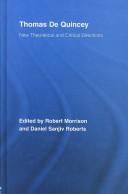
ISBN: 9780415399630 9780203933749 9781134148394 9781134148431 9781134148448 9780415876681 Year: 2008 Publisher: New York Routledge
Abstract | Keywords | Export | Availability | Bookmark
 Loading...
Loading...Choose an application
- Reference Manager
- EndNote
- RefWorks (Direct export to RefWorks)
De Quincey, Thomas, --- Quincey, Thomas de, --- De Kvinsi, Tomas, --- Kvinsi, Tomas de, --- De Quincy, Thomas, --- Quincy, Thomas de, --- DeQuincey, Thomas, --- Criticism and interpretation.
Book
ISBN: 1283739488 0809331497 9780809331499 9781283739481 9780809331482 0809331489 Year: 2012 Publisher: Carbondale Southern Illinois University Press
Abstract | Keywords | Export | Availability | Bookmark
 Loading...
Loading...Choose an application
- Reference Manager
- EndNote
- RefWorks (Direct export to RefWorks)
Criticism --- History --- De Quincey, Thomas, --- Quincey, Thomas de, --- De Kvinsi, Tomas, --- Kvinsi, Tomas de, --- De Quincy, Thomas, --- Quincy, Thomas de, --- DeQuincey, Thomas, --- Knowledge --- Literature. --- Criticism and interpretation.
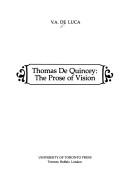
ISBN: 1442638125 1442653612 9781442653610 9781442638129 0802054803 9780802054807 Year: 1980 Publisher: Toronto
Abstract | Keywords | Export | Availability | Bookmark
 Loading...
Loading...Choose an application
- Reference Manager
- EndNote
- RefWorks (Direct export to RefWorks)
Thomas De Quincey: The Prose of Vision is the first full-length critical study of De Quincey's imaginative writings. Considering these writings as a 'prose of vision' transcending their origins in magazine journalism, the author stresses their relationship to the Romantic traditions of imaginative vision and inward quest. He traces continuing themes and their transformations throughout De Quincey's career, and he offers sustained critical readings of De Quincey's major works. Professor De Luca discusses, in chronological sequence, the original version of Confessions of an English Opium-Eater, in which De Quincey traces his passage from innocence to experience; Gothic tales and essays on murder, which reveal a fascination with the concept of power; and the major works of De Quincey's later years, including Suspiria de Profundis, The English Mail-Coach, and the revised Confessions, which show the richest development of his interest in vision and in self-exploration. The book concludes with a discussion of the equivocal implications in De Quincey's three late major works and relates these implications to the equivocal tendencies in the Romantic tradition itself - its uneasy yearning for transcendence and its courageous commitment to the flow of ordinary experience. This study, which makes a significant contribution to an understanding of De Quincey's works, will be of particular interest to students of Romanticism.
De Quincey, Thomas, --- Quincey, Thomas de, --- De Kvinsi, Tomas, --- Kvinsi, Tomas de, --- De Quincy, Thomas, --- Quincy, Thomas de, --- DeQuincey, Thomas, --- Criticism and interpretation. --- LITERARY CRITICISM / Gothic & Romance.
Book
ISBN: 1139083856 1108034594 Year: 2011 Publisher: Cambridge : Cambridge University Press,
Abstract | Keywords | Export | Availability | Bookmark
 Loading...
Loading...Choose an application
- Reference Manager
- EndNote
- RefWorks (Direct export to RefWorks)
Combining intellectual enthusiasm with analytical bite, David Masson's biography of the self-confessed opium eater provides readers with valuable insights into an author whose life oscillated between respectability, vagrancy and infamy. Published in the first series of English Men of Letters in 1881, only two decades after the death of Thomas de Quincey (1785-1859), and written by a man who, like his subject in his more prosperous years, was a journalist and editor in the heart of literary London, Masson's account describes a man and a nation at the peak of their cultural influence. Covering not only the Confessions, but also his essays in the London Magazine, Blackwood's, the Edinburgh Saturday Post and the Instructor, this literary portrait places the life - debts and drug use, but also fame, success and the friendship of some of the greatest writers of the age - in the context of the works.
English --- Languages & Literatures --- English Literature --- Authors, English --- De Quincey, Thomas, --- Quincey, Thomas de, --- De Kvinsi, Tomas, --- Kvinsi, Tomas de, --- De Quincy, Thomas, --- Quincy, Thomas de, --- DeQuincey, Thomas,

ISBN: 0416014119 Year: 1986 Publisher: New York (N.Y.): Methuen
Abstract | Keywords | Export | Availability | Bookmark
 Loading...
Loading...Choose an application
- Reference Manager
- EndNote
- RefWorks (Direct export to RefWorks)
82-392 --- Literatuur. Algemene literatuurwetenschap--?-392 --- English fiction --- Gothic revival (Literature) --- Horror tales --- Horror tales, English --- History and criticism. --- De Quincey, Thomas, --- Brontë, Emily, --- Brontë, Charlotte, --- Criticism and interpretation. --- 82-392 Literatuur. Algemene literatuurwetenschap--?-392 --- History and criticism --- Brontë, Charlotte, --- Brontë, Emily, --- Quincey, Thomas de, --- De Kvinsi, Tomas, --- Kvinsi, Tomas de, --- De Quincy, Thomas, --- Quincy, Thomas de, --- DeQuincey, Thomas,

ISBN: 0521572363 0521030501 0511582978 0511006365 9780511006364 9780511582974 Year: 1997 Volume: 25 Publisher: Cambridge, U.K New York Cambridge University Press
Abstract | Keywords | Export | Availability | Bookmark
 Loading...
Loading...Choose an application
- Reference Manager
- EndNote
- RefWorks (Direct export to RefWorks)
Margaret Russett uses the example of Thomas De Quincey, the nineteenth-century essayist best remembered for his Confessions of an English Opium-Eater and his memoirs of Wordsworth and Coleridge, to examine the idea of the 'minor' author, and how it is related to what we now call the Romantic canon. The case of De Quincey, neither a canonical figure nor a disenfranchised marginal author, offers a point of access to specifically Romantic problems of literary transmission and periodization. Taking an intertextual approach, Russett situates De Quincey's career against the works of Wordsworth and Coleridge; the essays of Lamb, Hazlitt, and other writers for the London Magazine; and discourses of ethics and political economy which are central to the problem of determining literary value. De Quincey's Romanticism shows how De Quincey helped to shape the canon by which his career was defined.
Authorship --- Romanticism --- Transmission of texts. --- Canon (Literature) --- Classics, Literary --- Literary canon --- Literary classics --- Best books --- Criticism --- Literature --- Literary transmission --- Manuscript transmission --- Textual transmission --- Criticism, Textual --- Editions --- Manuscripts --- Authoring (Authorship) --- Writing (Authorship) --- History --- History and criticism --- De Quincey, Thomas, --- Quincey, Thomas de, --- De Kvinsi, Tomas, --- Kvinsi, Tomas de, --- De Quincy, Thomas, --- Quincy, Thomas de, --- DeQuincey, Thomas, --- Criticism and interpretation. --- Transmission of texts --- Arts and Humanities

ISBN: 0804723931 9780804723930 Year: 1995 Publisher: Stanford Stanford university press
Abstract | Keywords | Export | Availability | Bookmark
 Loading...
Loading...Choose an application
- Reference Manager
- EndNote
- RefWorks (Direct export to RefWorks)
Quincey, de, Thomas --- 820 --- 82 --- Authorship --- Modernism (Literature) --- Self in literature --- Engelse literatuur --- Literatuur. Algemene literatuurwetenschap --- Psychological aspects --- De Quincey, Thomas, --- Quincey, Thomas de, --- De Kvinsi, Tomas, --- Kvinsi, Tomas de, --- De Quincy, Thomas, --- Quincy, Thomas de, --- DeQuincey, Thomas, --- Criticism and interpretation.
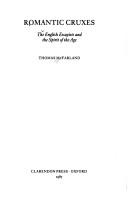
ISBN: 0198128959 Year: 1987 Publisher: Oxford Clarendon
Abstract | Keywords | Export | Availability | Bookmark
 Loading...
Loading...Choose an application
- Reference Manager
- EndNote
- RefWorks (Direct export to RefWorks)
820-4 --- English essays --- -Romanticism --- -Pseudo-romanticism --- Romanticism in literature --- Aesthetics --- Fiction --- Literary movements --- English literature --- Engelse literatuur: essay --- History and criticism --- De Quincey, Thomas --- -Hazlitt, William --- -Lamb, Charles --- -Criticism and interpretation --- Criticism and interpretation --- -Engelse literatuur: essay --- 820-4 Engelse literatuur: essay --- -820-4 Engelse literatuur: essay --- Pseudo-romanticism --- Lem, Carl'z --- Romanticism --- De Quincey, Thomas, --- Hazlitt, William, --- Lamb, Charles, --- Lamb, Charles --- Quincey, Thomas de, --- De Kvinsi, Tomas, --- Kvinsi, Tomas de, --- De Quincy, Thomas, --- Quincy, Thomas de, --- DeQuincey, Thomas, --- Criticism and interpretation. --- Elia, --- Lan-mu, Chʻa-erh-ssu, --- Chʻa-erh-ssu Lan-mu, --- למב, צ'רלס, --- チャールズ.ラム,
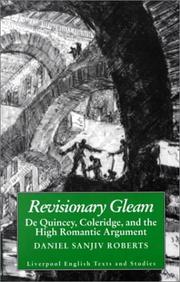
ISBN: 1781388253 1846313937 9781846313936 9781781388259 9780853237945 0853237948 0853238049 9780853238041 Year: 2000 Publisher: Liverpool Liverpool university press
Abstract | Keywords | Export | Availability | Bookmark
 Loading...
Loading...Choose an application
- Reference Manager
- EndNote
- RefWorks (Direct export to RefWorks)
This study includes much new information on Thomas De Quincey and his critical engagement with Coleridge, Wordsworth, Burke, Kant and others. The author subtly and convincingly brings overlooked dimensions of De Quincey's politics to the fore, and examines essays often ignored. The impressive reading of the Liverpool circle and the 1803 Diary should lead to reassessments of this period in De Quincey's development.
De Quincey, Thomas. --- Politics and literature --- Romanticism --- English --- Languages & Literatures --- English Literature --- History --- De Quincey, Thomas, --- Quincey, Thomas de, --- De Kvinsi, Tomas, --- Kvinsi, Tomas de, --- De Quincy, Thomas, --- Quincy, Thomas de, --- DeQuincey, Thomas, --- Criticism and interpretation. --- 82:316 --- 82:32 --- 82:32 Literatuur en politiek --- Literatuur en politiek --- 82:316 Literatuursociologie --- Literatuursociologie --- Coleridge, Samuel Taylor, --- Wordsworth, William, --- Wœ̄tsawœ̄t, Winlīam, --- Wurdzwurth, Wilyam, --- Varḍsavartha Viliyama, --- Axiologus, --- Coleridge, S. T. --- Kolʹridzh, Samuil, --- Кольридж, Самуил, --- Kolʹridzh, Samuil Teĭlor, --- Кольридж, Самуил Тейлор, --- Kūlīridzh, Ṣāmwīl Tīlūr, --- קולרידג׳, סמיואל טיילור --- Kūlīridj, Ṣāmwīl Tīlūr, --- كولردج، صمويل تيلور, --- קאָלרידש, ס. ט., --- Influence. --- Political and social views.
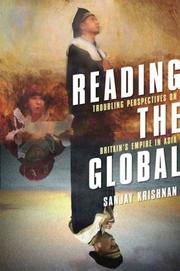
ISBN: 1283008858 9786613008855 0231511744 0231140703 Year: 2007 Publisher: New York : Columbia University Press,
Abstract | Keywords | Export | Availability | Bookmark
 Loading...
Loading...Choose an application
- Reference Manager
- EndNote
- RefWorks (Direct export to RefWorks)
The global is an instituted perspective, not just an empirical process. Adopted initially by the British in order to make sense of their polyglot territorial empire, the global perspective served to make heterogeneous spaces and nonwhite subjects "legible," and in effect produced the regions it sought merely to describe. The global was the dominant perspective from which the world was produced for representation and control. It also set the terms within which subjectivity and history came to be imagined by colonizers and modern anticolonial nationalists.In this book, Sanjay Krishnan demonstrates how ideas of the global took root in eighteenth- and nineteenth-century descriptions of Southeast Asia. Krishnan turns to the works of Adam Smith, Thomas De Quincey, Abdullah bin Abdul Kadir, and Joseph Conrad, four authors who discuss the Malay Archipelago during the rise and consolidation of the British Empire. These works offer some of the most explicit and sophisticated discussions of the world as a single, interconnected entity, inducting their readers into comprehensive and objective descriptions of the world.The perspective organizing these authors' conception of the global-the frame or code through which the world came into view-is indebted to the material and discursive possibilities set in motion by European conquest. The global, therefore, is not just a peculiar mode of thematization; it is aligned to a conception of historical development unique to European colonial capitalism. Krishnan troubles this dominant perspective. Drawing on the poststructuralist and postcolonial approaches of Jacques Derrida, Michel Foucault, and Gayatri Chakravorty Spivak, and challenging the recent historiography of empire and economic histories of globalization, he elaborates a bold new approach to the humanities in the age of globalization.
English literature --- Globalization in literature. --- Imperialism in literature. --- Capitalism in literature. --- History and criticism. --- Smith, Adam, --- De Quincey, Thomas, --- Conrad, Joseph, --- Abdullah, --- Korzeniowski, Józef Konrad Teodor, --- Korzeniowski, Joseph Conrad Theodore, --- Konrad, Dzhozef, --- Kʻang-la-te, --- Conrad-Korzeniowski, Joseph, --- Korzeniowski, Joseph Conrad-, --- Kʻonradŭ, Josep, --- Kʻonradŭ, Chosep, --- Kʻolladŭ, Josep, --- Konrad, Dzd. --- Conrad, Józef, --- קונראד, ג׳וזף, --- קונראד, ג׳וסף --- קונרד, ג׳וזף --- קונרד, ג׳וזף, --- קונרד, יוסף --- 康拉德, --- Konrad Nalecz Korzeniowsky, Jozef Tedor, --- Konrant, Tzozeph, --- Quincey, Thomas de, --- De Kvinsi, Tomas, --- Kvinsi, Tomas de, --- De Quincy, Thomas, --- Quincy, Thomas de, --- DeQuincey, Thomas, --- ʻAbd Allāh ibn ʻAbd al-K̇ādir, --- ʻAbd Allāh ibn ʻAbd al-Qādir, --- Abdoellah bin Abdelkader, --- Abdoeʼllah bin Abdiʼl Kadir, --- Abdulla bin Abdulkadar, --- Abdullah bin Abdul Kadir, --- Moensji Abdoel̉lah bin Abdil̉ Kadir, --- Munshi Abdullah, --- Munsyi Abdullah, --- Criticism and interpretation. --- Great Britain --- Asia --- Colonies --- History --- In literature.
| Listing 1 - 10 of 11 | << page >> |
Sort by
|

 Search
Search Feedback
Feedback About UniCat
About UniCat  Help
Help News
News